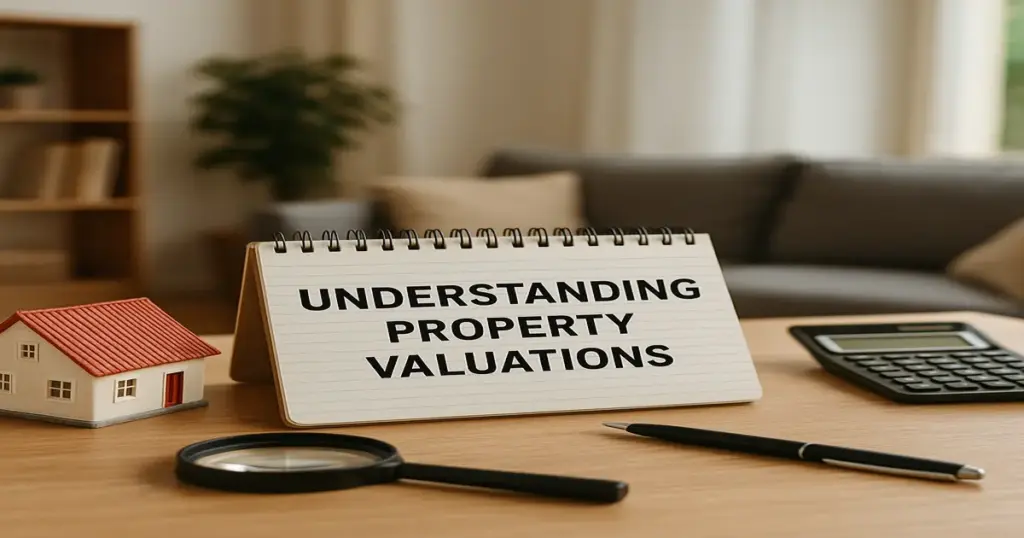Understanding Property Valuations: What Affects the Market Value of Your Home?
Understanding how a property is valued is crucial when selling, buying, refinancing, or investing. Property valuations are the cornerstone of any real estate transaction, providing an informed estimate of a property’s current market value.
But what goes into this figure? Who conducts the valuation? And how can homeowners ensure their property is accurately valued?
This article explains how property valuations are carried out, the key factors influencing market value, and how to prepare for a valuation to get the best outcome.
What Is a Property Valuation?
A property valuation is an expert estimate of a property’s market value conducted by a qualified surveyor or valuer. The value is determined using a combination of on-site inspection, market analysis, and comparable sales data.
Valuations are used for many reasons, including:
Setting an asking price before a sale
Securing a mortgage or refinancing
Legal matters like probate, divorce, or inheritance
Insurance assessments
Property taxation or capital gains calculations
There are various types of valuations, such as market appraisals by estate agents, formal RICS valuations (for official purposes), or automated valuations by online platforms. Each serves a different purpose and varies in reliability.
Who Conducts Property Valuations?
Qualified professionals should perform valuations. This typically means a UK-registered surveyor (Royal Institution of Chartered Surveyors). Mortgage lenders rely on these independent professionals to provide unbiased valuations that reflect real market conditions.
Estate agents may offer free valuations, but these are often optimistic appraisals to win business. A formal valuation from a chartered surveyor is essential for legal or lending purposes.
How Is a Property Valued?
Property valuations follow a structured methodology, but no two are identical. Here’s a typical step of how surveyors value a property:
External Inspection
The valuer inspects the building from the outside to assess:
General condition and construction type
Age and style of the property
Roof type and condition
Garden and outdoor space
Position on the street and kerb appeal
Internal Inspection
Inside, the surveyor will assess:
Number of rooms and layout
Floor area (square footage)
Condition of fixtures and fittings
Evidence of damp, structural issues, or poor maintenance
Modernisation or recent upgrades
Comparable Sales Data
This involves researching similar properties recently sold in the same area. Factors Such as Size, Location, and sale date are considered to ensure a like-for-like comparison.
Market Conditions
Current economic and market trends are accounted for. For instance:
Is the area in high demand?
Are prices rising or falling?
How long are similar properties taking to sell?
Special Features and External Factors
Unique aspects that may add or detract value are noted:
Proximity to transport, schools, parks, and shops
Views or privacy
Nearby developments or planning restrictions
Noise levels or environmental risks
Key Factors That Influence Property Value
While the valuation process is systematic, the final figure is influenced by many interrelated factors. Let’s explore the significance of Location, Location, Location
This is the most well-known driver of value. Properties in desirable areas command higher prices due to:
Access to good schools
Proximity to city centres or commuter routes
Low crime rates
Access to green spaces
Strong local job market
Even properties on the same street can have different valuations based on whether they’re closer to thethethead, o a desirable cul-de-sac.
Size and Layout
Larger properties generally fetch higher prices, but layout matters too. Open-plan spaces, additional bathrooms, or flexible usage (such as a home office) increase desirability.
Usable square footage is especially significant. A well-designed 3-bedroom house may be worth more than a poorly laid-out 4-bedroom one.
Condition and Presentation
A property in pristine condition requires fewer repairs and is more appealing to buyers. Valuers look for:
Fresh paint, flooring, and décor
Up-to-date kitchens and bathrooms
Energy efficiency upgrades (double glazing, insulation)
Cleanliness and tidiness
Properties in poor condition may see their value reduced to reflect the cost of necessary renovations.
Age and Construction
Older properties may benefit from character and solid construction, but have drawbacks. Meanwhile, new builds might offer modern insulation and low maintenance but suffer from SM, all plot sizes, or overpricing.
Construction materials matter too. Timber-framed homes or those with non-standard materials may be viewed as riskier and affect mortgage availability.
Renovations and Extensions
Improving your property can boost its value – but only if done well. Valuers consider:
Loft conversions
Conservatories
Kitchen and bathroom upgrades
New roofing, windows, or heating systems
However, not all upgrades deliver equal return. Over-personalised or poor-quality additions can peel.
Energy Performance
An energy-efficient property is increasingly valuable. A high EPC (Energy Performance Certificate) rating can raise value, especially in areas with rising energy costs or eco-conscious buyers.
Upgrades such as solar panels, insulation, and modern boilers are viewed favourably.
Market Trends and Demand
External economic conditions also play a major significant
Interest rates: Low rates boost affordability and push up prices
Inflation: Affects building material costs and buyer budgets
Government policies: Stamp duty holidays or Help to Buy schemes can increase demand
Seasonality: Spring and summer tend to see higher prices due to increased activity
Valuers use this broader context to adjust for local conditions.
How to Prepare for a Property Valuation
You’re planning to sell your home. It pays to be proactive and plan to sell, especially for sale. It pays to be practical, with tips to help you achieve a favourable valuation:
Tidy and Declutter
A clean, organised home leaves a better impression and allows valuers to see the actual space, all Improvements.
Prepare a written list of all upgrades or repairs made over the years. Include dates, costs, and warranties if available.
Fix Minor Issues. Minor defects, such as leaky taps, cracked tiles, or broken light fittings, can reduce perceived value. Fix them in advance.
Improve Kerb Appeal
First impressions matter. Trim hedges, clean driveways, and touch up exterior paint if needed.
Show Documentation
If you have planning permission, building regulations approval, or warranty certificates, have them ready.
How Accurate Are Valuations?
Valuations are estimates, not guarantees. Market fluctuations, buyer behaviour, and the time of sale affect the total sale price. That said, valuations from experienced RICS surveyors are generally reliable benchmarks.
Remember, a property is ultimately worth what someone is willing to pay. If several buyers are interested, you may achieve more than the valuation. If the market is slow, even an accurate valuation may need revising downward to attract offers.
Can You Dispute a Valuation?
If you feel your property has been undervalued—especially by a mortgage lender—you can challenge it. You’ll need:
EvidenYou’llrecent comparable sales
Details of improvements made
An independent second opinion (if needed)
Lenders sometimes allow appeals but may stick to conservative valuations to reduce their risk.
Why Property Valuations Matter
Understanding your property’s market value is powerful for financial decisions, pricing strategies, and investment planning. Whether you’re selling, buying, or investing, an accurate valuation offers clarity and control.
Getting multiple opinions—from estate agents and RICS surveyors—can help you get a fuller picture and set realistic expectations.
FAQs: Understanding Property Valuations
How long does a property valuation take?
A standard inspection usually takes 30–60 minutes, depending on the property size. A permit is issued within 1–3
3 workdays after the inspection. Will the owner be present during the valuation?
It’s not mandatory—it’s been—but it allows you to answer questions and highlight any upgrades the valuer might not notice on their own.
What is the difference between a valuation and a survey?
A valuation estimates the market value. A survey (like a Homebuyer Report) is more detailed and identifies structural issues and potential repairs.
How often should I get my home valued?
Generally, it’s advisable to git’s valuation before selling, refinancing, or making property decisions. In a fast-moving market, values can change within months.
What is a desktop valuation?
A desktop valuation uses online data and comparable sales without a physical inspection. It’s quicker, cheaper, and accurate.
Can estate agent valuations be trusted?
Estate agent valuations can be helpful guides, but they are often optimistic. It’s wise to examine them before comparing them to formal valuations.
Will renovations increase my home’s value?
Yes, ehome’ sllyehome’ slyly bathroomss and loft conversions—but the quality and relevance of the work matter. Not all upgrades recoup their cost in value.
What happens if my mortgage valuation is lower than expected?
You may need to renegotiate the purchase price, increase your deposit, or seek another lender. You can also appeal the valuation with supporting evidence.
What is market value?
Market value is the estimated amount a willing buyer would pay to a willing seller, in an open market, without undue pressure or time constraints.
How can I increase my home’s valuation before selling? Improvements like repainting, fixing defects, enhancing kerb appeal, and upgrading kitchens or bathrooms?? Present the house on the day of the valuation.
Final Thoughts
Understanding property valuations is essential whether you’re a first-time investor or homeowner preparing to sell. With many factors at play—location, condition, size, and market trends—a professional valuation helps ground your expectations and guide your decisions.
While valuations are not an exact science, they remain one of the best tools for confidently navigating the property market.
Useful External Links for Property Valuations in the UK
Royal Institution of Chartered Surveyors (RICS) – Guidance on property valuations and how to find a chartered valuer:
https://www.rics.org/ukHM Land Registry – Access to property price data and historical sales for comparables:
The Property Ombudsman – Ensures estate agents follow ethical guidelines during property appraisals
Read our top Blogs:
Sell My Property Fast For Cash In Wandsworth
What to Do If Your House Won’t Sell: Fast Solutions That Work
How to Sell a House Fast: Proven Tips to Get a Quick Sale Without Estate Agents
Call +447702210159 our friendly team for a same-day offer





